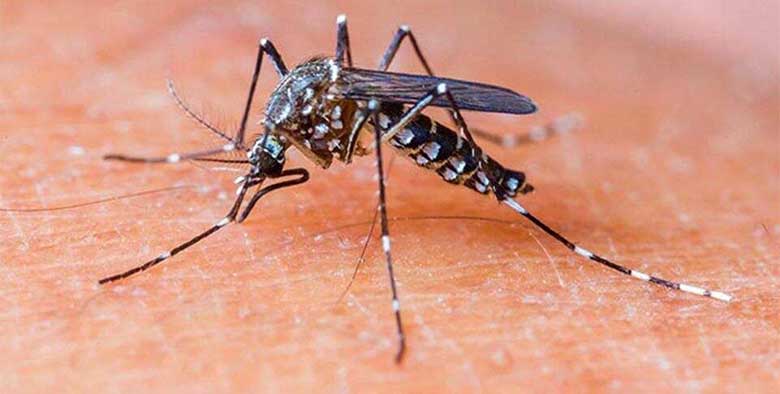- Know Everything About Nipah Virus, Which Is Back In Kerala Again
- Kevin Porter Jr Arrested On His Girlfriend’s Assault Charge
- Market Change Overnight - Know The 8 Things That Did It
- Who Are Alba Baptista And Chris Evans Married On The Weekend?
- Disrupted India vs Pakistan Asia Cup 2023 Match on Reserve Day
- 10 Common Foods That Contain No Calories or Are Very Low in Calories
- Men’s Styling Tips - Know the 9 Common Style Mistakes to Avoid
- Coco Gauff Beats Karoline Muchova and Reaches the US Open Final
- Danny Masterson Gets Life Sentence of 30 Years for Two Rapes
- Experience A Splendid Vacation in Kashmir with These 15 Gorgeous Sights
- India
- Saturday , July 27, 2024
- Last Published Sep 12, 2023, 6:48:32 PM

Dengue Cases On Rise - What Changes Can Help You Prevent The Disease
Rainy days are good for us as we get relief from scorching heat. However, the season is bad on the other hand. Rains cause water logging that become a breeding place for mosquitoes. As the season is going on, there is a rise in dengue cases across India and other parts of the world with heavy rains.
What is Dengue?
Dengue is a viral infection which occurs to you when you have a transmission of the dengue virus (DENV) caused by the bite of an infected mosquito. As you have this viral infection, you can experience body ache, pain around eyes, high fever, joint pains, headache, nausea, skin rash, myalgia. Your illness can vary from another person, and you could be asymptomatic if your illness is in the very early stage. Some of you have mild to severe infection from the very first day after a mosquito’s bite.
According to the World Health Organization, approximately half of people on this earth are at a higher risk of dengue. Around 100-400 million dengue cases get reported each year, especially during rains.
Dengue Symptoms
Many people have minor or no symptoms of dengue. They recover from their illness within 1-2 weeks. In very rare cases, dengue can be severe and death causing. Here are some common signs and symptoms of dengue that usually appear after 4-10 days of infection:
• Skin rash
• High fever ((104°C)
• Nausea
• Vomiting
• Eye pain
• Joint and muscle pains
• Swollen glands
• Severe headache
Some people might experience severe dengue symptoms as their fever goes away.
• Severe abdominal pain• Bleeding nose or gums
• Fatigue
• Constant vomiting
• Rapid breathing
• Restlessness
• Blood in stool or vomit
• Being very thirsty
• Pale and cold skin
• Weakness
Causes or Risk Factors of Dengue
In general, dengue happens to a person when an infected mosquito bites him/her. After 4-10 days or from the first day of infection, the person starts experiencing respective symptoms. It usually occurs due to the dengue virus, DENV. It could happen to any person. However, it severely affects people with chronic health issues like:
• Diabetes• Heart diseases
• Kidney problems
• Liver diseases
• Cancers
• HIV/AIDS
• Population density
• Bad water storage practice
• Living in tropical areas
Complications
In severe cases, dengue could lead a person to have organ damage and internal bleeding. You might experience a sudden decrease in blood pressure that could lead you to have a shock. In a very rare case, it could lead a person to death. A pregnant woman could transmit the virus to her baby if she had dengue during her pregnancy. The baby could have a low birth weight or preterm birth if his/her mother had dengue during her pregnancy.
Dengue Treatment
You should immediately consult your doctor if you have visited a tropical area or experience a mosquito bite. Never make a delay if you have been experiencing high fever for more than 3 days. After interacting with you and conducting a physical examination, your doctor will advise you with the most suitable treatment plan that might include medications, precautions, and vaccines. Your doctor may advise you to take a vaccine, Dengvaxia, if you are between 9 and 45 years. You may need to take three doses of this vaccine in 12 months as per your doctor’s recommendation.
How to Prevent Dengue/ Preventive Tips for Dengue
Dengue can happen to anyone living or visiting tropical areas or having bad water storage habits. However, you can prevent yourself from this viral infection. Here are some effective preventive tips for you:
• Wear full-sleeve shirts, paints, and allied outfits to protect yourself from mosquitoes' bites Further, sleep under a mosquito net and use mosquito repellent• Never let the water be stored or untreated for a longer period. Change water regularly if you use air coolers, empty your water pots, and remove the items that can be a water storage and mosquitoes breeding place
• Keep your surroundings clean. For this, you can check and clean your drainage, trash cans, and gutters
• Wear light-colored outfits if you are going out of your residence. Your outfits cover your whole body and should not be an attraction for mosquitoes
• Place screens or curtains on doors and windows to keep mosquitoes out of your home. While installing screens, keep proper ventilation in mind
• Keep your fans on as they make it hard for mosquitoes to get into your room or home
• Plant mosquito repellent plants such as lemongrass and mint to keep mosquitoes away from your abode
• Avoid going outside in early morning hours or in the afternoon as mosquitoes are highly active at that time
• Be very careful and keep protective gears like gloves and net with you if you are traveling to mosquito prone areas
• Pay proper attention to your personal hygiene. Get rid of sweat or odor if you have a lot of sweating or body odor. It is as mosquitoes are highly attracted to body odor or sweat
• Educate yourself about dengue and all things associated with it such as dengue symptoms, causes, treatment, and prevention
• Collaborate with others to make public places in or around your city clean
Conclusion
Dengue is a vector borne disease that usually spreads on rainy days through an infected mosquito’s bite. It is treatable if addressed well in the mild to moderate stages. Having an idea about dengue symptoms, causes, risk factors, treatment, and preventive tips will facilitate you prevent yourself from this viral infection.
Disclaimer - The texts with tips or advice mentioned here are only for generic information, but not for a substitute of medical advice. Before applying any advice or tips, you should consult a respective doctor or expert. ATT is not responsible if you have any bad impacts on your health.












